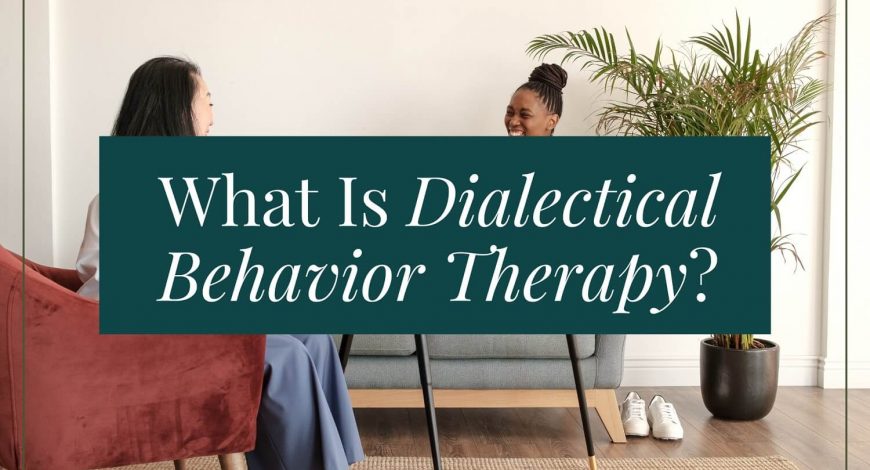What Is Dialectical Behavior Therapy (DBT)?

Have you ever wished you could change the way you react to things? Sometimes, the way we cope with things actually leads to more distress, which can be a tough cycle to break out of. One evidence-backed way to practice mindfulness, regulate emotions, improve relationships, and tolerate distress is through Dialectical Behavior Therapy, or DBT.
Why are there different types of therapy?
It’s no secret that the human brain is complex. That’s why there’s more than one way to approach mental health treatment. These different approaches, or modalities, have unique ways of looking at mental health and how to help people feel better. Some of the therapy modalities that you may have heard of are:
- Dialectical Behavior Therapy (DBT)
- Cognitive Behavior Therapy (CBT)
- Acceptance and Commitment Therapy (ACT)
- Eye Movement Desensitization and Reprocessing (EMDR)
- Somatic Experiencing (SE)
- Emotionally Focused Therapy (EFT)
- Internal Family Systems (IFS)
Each of these approaches uses different resources and reasoning to improve people’s quality of life. The goal with any type of therapy is to help relieve distress and increase resilience while giving folks a safe place to process things. Not every modality will be the right fit for everyone, so it can be helpful to learn more about different therapy modalities to see which is a good fit for you and your needs.
What does DBT help with?
DBT was originally developed to help people manage Borderline Personality Disorder (BPD), though it has been proven to help with other mental health issues like anxiety and trauma. DBT is a type of cognitive behavior therapy, which means it’s focused on patterns of thinking. In particular, DBT aims to help people learn to live in the present moment, deal with stress more effectively, maintain or improve their relationships, and manage their emotions.
If you’re wondering what the word “dialectical” means you’re not the only one. In dialectical thinking, as explained by the founder of DBT, Marsha Linehan, is the “middle ground between two opposite ways of thinking and acting.” Instead of thinking in absolutes or extremes, dialectical thinking encourages us to find the middle ground where more than one thing can be true.
DBT asks us to balance the two opposing forces of acceptance and change. Change is inevitable in life, and learning how to practice acceptance can reduce the suffering that comes from fighting something inevitable.
How does DBT help?
DBT is a modality that teaches you new skills to use in your everyday life. These skills fall into the following categories:
Mindfulness
When we aren’t focused on the present moment, we run the risk of being disconnected from our own experience. Instead of being in tune with our senses and what is going on inside of ourselves, we get carried away by our negative thought patterns.
DBT teaches mindfulness skills to give you a foundation that you can use in all DBT skills. Mindfulness lets you slow down and pause before you react so you can make an informed decision on what to do next.
Emotional Regulation
We’ve all had moments where our emotions get the best of us and we say or do something that we later regret. In times of heightened emotions, it’s easy to react without thinking, which can lead to problems in our relationships and suffering on our part. Emotional regulation in DBT gives us options for controlling our emotions when we’re upset.
Part of the problem with regulating emotions is that we don’t recognize them when they come up. Emotions that are intense are hard to deal with, and so it can be easier to just push them aside or let them control you. When you learn how to notice and name the emotions you’re feeling, it can help you feel less out of control and help you manage your emotions more effectively.
Distress Tolerance
Dealing with distressing emotions is, well, distressing. It doesn’t feel good to be upset or stressed or threatened. When we feel distressed, sometimes we do or say things that we don’t mean or that come back to haunt us later.
It can be tricky to know what to do in the moment when you’re distressed or upset. We’re all going to have moments from time to time that are overwhelming or make us feel out of control. The distress tolerance skills taught in DBT give you options for what to do when you’re in distress so you can ride out that painful emotion instead of doing something impulsive.
Interpersonal Effectiveness
We all hope our relationships stay strong and that we never have to deal with interpersonal drama, but that’s not how life really works. Whenever we’re interacting with other people, there’s a chance that miscommunication will occur because we can’t read minds.
Interpersonal Effectiveness skills help you learn how to communicate more effectively, in a way that maintains your relationships with others and respect for yourself. We all have to deal with challenging people from time to time, and having a plan for how to approach these situations can leave you feeling empowered.
How can I learn more about DBT?
Are you interested in learning more about Dialectical Behavior Therapy? Join Holistic Consultation clinicians Angela and Paige for the first part of their 3 part DBT workshop intensives focusing on Interpersonal Effectiveness on August 23rd, 2022.
During these intensives, there will be time for mindfulness exercises, guided imagery, and deep reflection. The workshops will be hybrid and will have in person and an online option available.
Learn More & Register Here
Want to schedule a 10-minute call with our Intake Coordinator? Check out our scheduling link here.